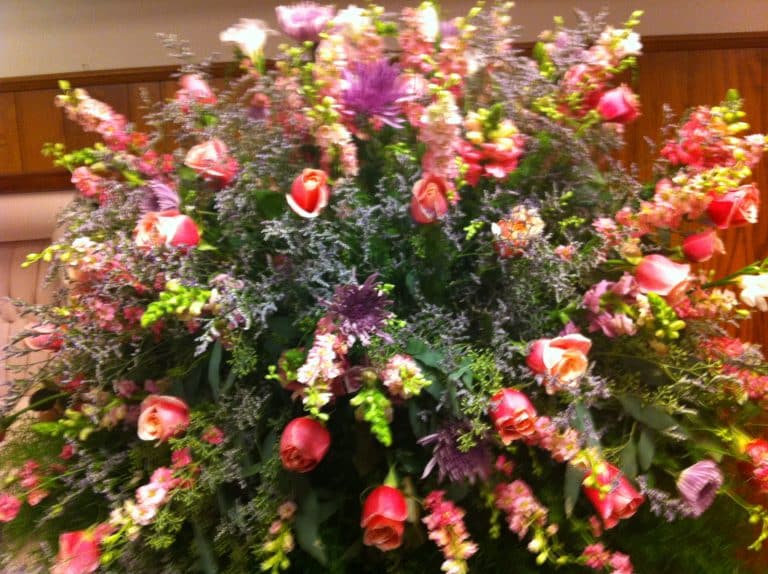These days my heart is turned to a woman, a sister, who is the mother of one I love. That one is my husband, and my heart is turned to him too, as well as to his four sisters and father. Why? Because their beloved matriarch, and wife passed from this side of the veil to the other, not that long ago.
It was a holy week, and a tough week, but I can say this: everything I’ve ever heard about in Mormonism concerning bodies and spirits and worlds beyond seemed real. So, so real.
A few minutes before her passing, her breathing changed, and then calmed, and then changed, and then calmed again. I went downstairs, but returned when my husband called my name. Her breaths were gone. Her heartbeats were gone.
I started to think about the veil and the thinness, because it had never felt more thin in my entire life, even though I have experienced loss before. Maybe because I had never been so close, in the same house. I thought about how spirits can live without bodies, but bodies cannot live without spirits: It is the spirit that gives life; it is the spirit that gives warmth. Without it, the body is not the body we remember, the body we knew and loved. It is part of that person, but only part. Only the vehicle. Or the glove.
I wrote more about my feelings on loss and mourning here, and think that they may be worth reading–not because I am a great writer, or because my experience is unique, but rather because death is universal, and all of us will one day have cause to mourn, or to be mourned. I also think that mourning is important, and sacred by its very nature. This might be because mourning is a very specific kind of remembering and heart turning. It also gives us a chance to have soft hearts, and to feel tender things.
In my soft state, the thing that most impressed me was watching my sister-in-laws flutter around their mother with immense love and purpose. (The thing that second-to-the-most impressed me was watching my husband who never sits still, sit still, beside his mother, to hold her hand gently and speak soft words.) Each sister has different skills, abilities, and talents, but used the ones that they are blessed with, or have nurtured, to the benefit of their mother in her final moments.
Witnessing it reminded me of a beautiful and concise description of the Relief Society penned by Emmeline B. Wells in 1895, while she served as the General Secretary:
The main objective of the Society is the care of the needy, the sick, the helpless and the unfortunate, to visit the widow and the fatherless, to administer comfort and consolation as well as temporal relief of physical wants, to see that none are left to suffer…also to care for the dying and the dead, to be at the bedside of the lonely ones when death is near, to robe the body neatly and properly for burial when all is over, and to perform those kindly deeds with tenderness and grace. (Emphasis added.)
My sisters-in-law did each of those kindly things in a way that would have made Emmeline proud. And their mother. And me.
Now, “when all is over,” I find myself wanting to remember my mother-in-law well, so that my children may remember her well, even though they aren’t born yet. Who she was will be part of who they are, and I want them to understand and feel close to her. I also want to remember her simply because human lives are worth remembering. Even female human lives. Even ones that were not overly grand, because really, every life is grand in its own way.
This life, this woman, Janice, was a grand one. She was grand because she was kind and because she cared about deep things, deeply. One of those things was Christ and his gospel (which I think is the thing she would have said she cared most about). Her faith was a very straightforward faith. One that is not very much like mine, but that is admirable in its strength. She believed in the atonement, and that because of it, it was okay for us not to be perfect: It was just necessary for us to use its grace giving powers as perfectly as possible.
Another thing Janice cared about was her family, including her husband that she met when she was very young and who she loved a long, long time, and who she asked when he returned from his mission when they would get married, and he said two years, and she said that if it would be two years, she would go on her own mission. And she did, to Norway. Next are her children and grandchildren, who together she considered her crowning jewels and greatest joy.
A third thing is education and learning. She was a school teacher for many years. She loved the children she taught and they loved her back. How do I know that? Because I saw it once, in action. My husband and I helped her teach her class the first day she came back from six months of sick leave, when she was still sick. It was clear that they loved her. I know too because they made the sweetest flowers with the sweetest messages of gratitude and loss, when she passed. One child thanked her for teaching her how to read and write. Another thanked her for teaching him how to speak English. Another thanked her for teaching her multiplication. All of them thanked her for her smile, and many told her she was the best teacher that they ever had.
 A fourth thing is her love of cultures and peoples (which my husband definitely inherited). She lived in New Zealand when she was a small girl, and adopted everything she could from it, including a native dance called poi ball dancing. She also loved Norway, and elsewhere, and was frequently welcoming individuals from other countries to live in her home, occasionally for years at a time. Hence, there are a few women who call her their American mom.
A fourth thing is her love of cultures and peoples (which my husband definitely inherited). She lived in New Zealand when she was a small girl, and adopted everything she could from it, including a native dance called poi ball dancing. She also loved Norway, and elsewhere, and was frequently welcoming individuals from other countries to live in her home, occasionally for years at a time. Hence, there are a few women who call her their American mom.
There are many more things that I could add, but I will rest here with a full heart, turned to one who has passed on, and the legacy she left. I also invite you readers to share your stories of loss, or life, or comforting, or perhaps to answer the following questions:
How may we best mourn with those who mourn?
How may we best remember those who have passed on?





2 Responses
What a beautiful tribute to your mother in law, Rachel. Thank you for sharing this sacred experience with us. As hard and horrible as death is, it sounds like your mother had a beautiful one, with her family by her side every minute during those last days.
This us such a beautiful tribute to your mother-in-law. I admire you for learning so much about the character of someone you were blessed to know for so little time, and for your plans help your future children know her.